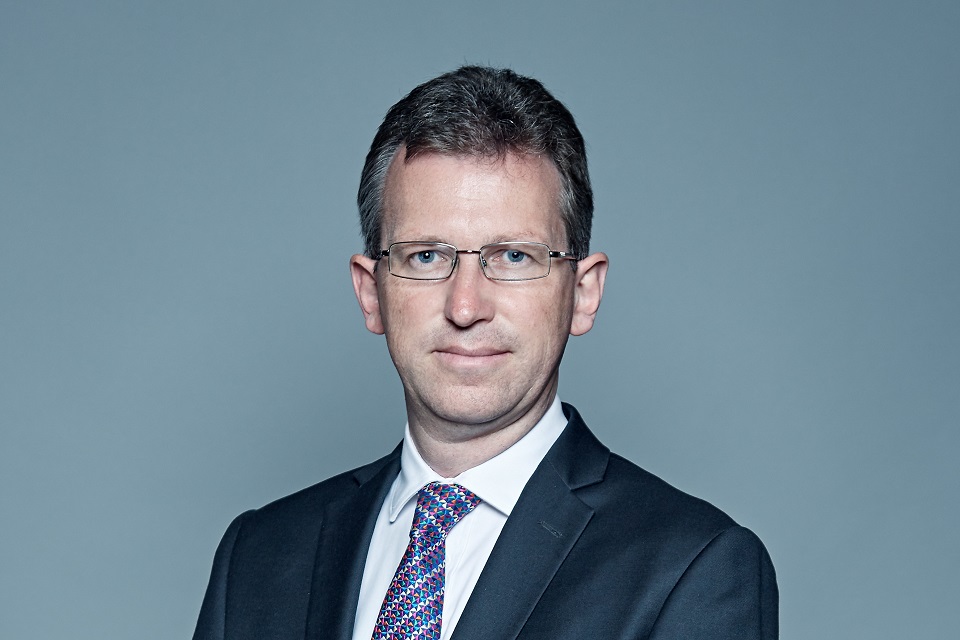Jeremy Wright speech to Edinburgh TV Festival
Secretary of State for Digital, Culture, Media and Sport, Jeremy Wright outlines his support for the UK’s broadcasting sector.

It is an honour to be here at this very prestigious festival.
As you say, I’m fairly new to this job and I recognise that I have a lot to learn, but I hope you will indulge me if I offer some preliminary thoughts on some of the things I have noticed so far.
Today’s discussion is an important one. It is quite clear that the world of broadcasting is changing, with new channels and content producers transforming the media landscape.
For me one fact brings this home loud and clear. Young people in Britain now recognise the name YouTube more than they recognise the name of the BBC.
In these changing times, we must look at what our British broadcasters can do to adapt and thrive.
One way to do this is to become more transparent, as the recent BBC Charter Review demonstrated with a huge step forward.
Another way is to become more national.
A media that is clustered in the capital can’t possibly reflect and represent the rich and diverse tapestry that is the United Kingdom.
It is clear that the development of Media City Salford has been great for the BBC, great for ITV and great for an exciting cluster of tech and production companies in the region.
But it has also been great for the UK as a whole, ensuring greater diversity and representation both on and off screen.
I am delighted that Channel 4 has recently agreed to move 300 staff out of London, with more to come, and to increase spending on programmes outside London to 50 percent of what they do.
I am looking forward to hearing the location of the new national HQ and creative hubs in October and I hope all broadcasters and producers will follow their lead and encourage the spread of jobs, prosperity, and opportunity beyond London.
British broadcasting is having an increasing impact not just across the UK but across the world. UK TV programming sales are now at around a billion pounds a year.
And Planet Earth 2, Midsomer Murders, and Sherlock have been sold to over 200 territories, with Sherlock, for example, being seen by 17 million viewers in China alone.
From Baker Street to Beijing the reach of UK broadcasting is so wide. And it is getting wider.
And although British television is changing, there are some long established characteristics that make it so impressive and important. Television, for example, has always been able to bring us together.
It creates truly national moments through programmes like Planet Earth, Bake Off and even Love Island, helping to create common experiences and bind our communities.
And public service broadcasters remain a vital part of the broadcasting landscape, with 85 percent of people in this country still watching them every week.
Nine out of ten people in the UK think that programming and news coverage from Public Service Broadcasters is trustworthy, a vital asset in the era of fake news.
And strong public service broadcasters mean a strong broadcasting sector as a whole.
For example, they are vital in helping all broadcasters find talent, and one of the things I have heard loud and clear already is how important it is to find the right talent in this industry.
This festival has recognised that for a long time – with the proceeds of ticket sales going to help provide an entry level route into the industry and to give talented individuals in the early stages of their careers a step up.
I pay tribute to that work in helping so many people to have a brighter future in this industry.
And talking about the future, I wanted to finish by saying just a few words about Brexit, which I know is on the minds of many people here.
I know that there is concern about how talent will be able to move between the UK and the EU after our exit from the European Union.
Although you will understand that the final outcome is still subject to negotiation, I can say that the government fully understands how important mobility is for this sector.
As outlined in the recent White Paper on our future relationship with the EU, we are seeking to agree a framework for mobility with the EU.
This will include reciprocal arrangements to allow UK nationals to visit the EU without a visa for short term business reasons, with equivalent arrangements for EU citizens coming to the UK.
And we are working on a broader accord with the EU on culture and education that will, among other things, allow for the temporary movement of goods for major events, tours, exhibitions, and productions.
Beyond that, as you know we have already reached an agreement with the EU on citizens’ rights, which will provide certainty to EU citizens currently living in the UK.
And we will be developing a future immigration policy to welcome the people that we need and that we want to come here.
We understand the importance of retaining European Works Status for the sector, and we were able to confirm this earlier in the year.
I recognise of course that there are still issues to be resolved in this process and you have my assurance that I will make the case for the interests of this sector as we seek to resolve them.
But regardless of our settlement with the EU, broadcasting will remain a vital part of what Britain offers the world.
Because we have a broadcasting sector that’s really worth shouting about.
Thank you for what you do to contribute to that, and I hope that you enjoy the rest of the festival.